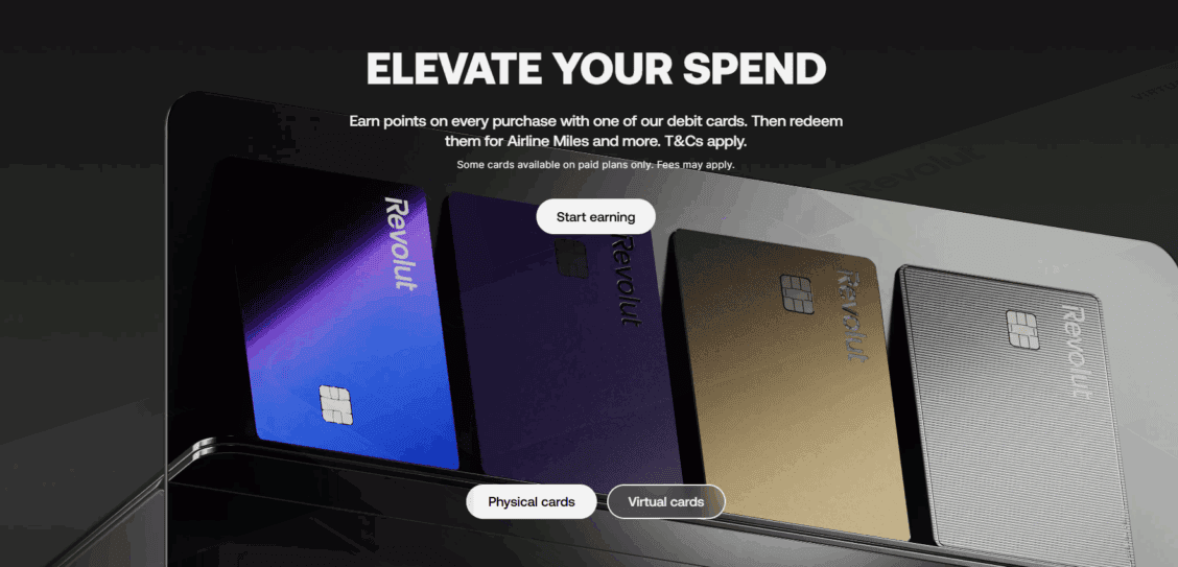
Revolut Review
- 19th Jul, 2025
- | By Linda Mae
- | Reviews
Revolut has grown from a travel focused currency exchange app to a full financial platform with millions of users worldwide. Founded in 2015 in the UK, it disrupted traditional banking by offering digital first services that combine personal finance, global payments and investment tools in one app. As of 2025 it operates in multiple countries and serves individuals and businesses with a wide range of financial products. Lets read more about Revolut Review.
Unlike traditional banks, Revolut doesn’t have physical branches. Instead it uses an app to give users access to services like budgeting tools, currency exchange, stock trading, crypto and international payments. It’s particularly popular with younger, techy users and those who do cross border transactions frequently.
One of Revolut’s key strengths lies in its attempt to simplify global finance. Users can hold and exchange over 25 currencies, pay abroad with minimal fees, and track all transactions in real time. However, the company’s aggressive innovation strategy has sometimes raised questions around regulation and customer support readiness.
In recent years, Revolut has been expanding its footprint with banking licenses in select markets, allowing it to offer deposit accounts and lending services. Yet, it still operates as an e-money institution in others. This mixed regulatory presence makes it important for users to understand how their funds are protected.
Table of Contents
ToggleAccount Types and Setup Experience | Revolut Review
Revolut offers several account tiers to match different user needs: Standard, Plus, Premium, and Metal. The Standard plan is free and includes essential features like currency exchange, virtual cards, and budgeting tools. Upgraded plans offer extras such as travel insurance, lounge access, and higher exchange limits, with Metal being the most premium option. Each tier is designed to meet the financial habits and priorities of different user types.
Setting up a Revolut account is usually quick and straightforward. New users download the app, verify their identity through a government-issued ID, and can often begin using basic services within minutes. The app walks you through each step and prompts for additional information when needed. Revolut’s interface is sleek and intuitive, making navigation easy even for those new to digital banking.
Where it stands out is in its minimal paperwork and digital-first onboarding process. Unlike traditional banks that often require in-person visits and multiple documents, Revolut makes it easy for anyone to open and operate a multi-currency account from their smartphone. That said, some users have reported friction when it comes to verifying documents or resolving flagged accounts during sign-up. Delays in approval are not widespread, but they do occur, especially during high-traffic periods or when users submit unclear documents.
Overall, Revolut makes starting an account simple and efficient, particularly for tech-savvy users. Still, it’s worth being prepared for verification steps that could slow things down if all requirements aren’t met clearly.

Currency Exchange and International Payments
Revolut built much of its reputation on making global money movement fast and affordable. At the heart of this capability is its multi-currency feature, allowing users to hold and exchange over 25 currencies from a single app. Users can convert funds at interbank rates during weekdays and send them to other Revolut users or external bank accounts with minimal fees.
If you’re a traveler or remote worker dealing with multiple currencies this is a big plus. The app tracks real time exchange rates and has low cost transfers to over 200 countries. Compared to banks or other money transfer services the cost savings can be huge especially if you’re on a paid plan with higher free exchange limits.
But be aware of a few things. Weekend currency conversions come with a markup, so if you’re not careful when you convert your funds it can add to the overall cost. And while most transfers are fast some international transfers may take a couple of business days depending on the recipient’s bank and country.
Users can also set up recurring payments and split bills with friends in different countries. These tools help simplify complex multi-currency scenarios and are especially useful for people with international commitments, like freelancers paid in multiple currencies or families with global ties. In short, Revolut continues to offer one of the more competitive options for cross-border payments and currency exchange, though users need to be aware of timing and plan limits to fully optimize it.
Card Features and Spending Management
Revolut provides users with a range of card options, each built to support modern spending habits. Users can choose between physical debit cards, virtual cards for online transactions, and single-use disposable cards that expire after one use. The cards are linked directly to the user’s Revolut account and work seamlessly for both local and international purchases.
One standout feature is the ability to create and manage multiple virtual cards, which can help protect against online fraud. The app also includes granular control over your card settings. You can freeze or unfreeze cards, set monthly budgets, control ATM usage, and enable or disable contactless, swipe, or online payments.
Spending insights are automatically generated, helping users visualize where their money goes. These analytics break down expenses by category, like groceries, travel, or subscriptions, making it easier to spot patterns and stick to budgets. There’s also a built-in savings tool called “Vaults,” which allows users to round up purchases and save the spare change.
The experience is enhanced by instant notifications for every transaction. This real-time feedback helps users keep track of spending and detect unauthorized charges quickly. For frequent travelers, Revolut cards work globally and often provide better exchange rates than local banks or currency booths. However, occasional reports of card declines or payment issues during travel exist. These are usually linked to insufficient balances or anti-fraud measures but can cause frustration. Overall, Revolut’s card and spending features are modern, user-centric, and designed for global lifestyles.
Crypto, Stocks, and Commodities: Trading with Revolut
Revolut has carved a niche for itself by integrating trading services directly into its app. Users can access a range of investment products, including cryptocurrencies, stocks, and commodities like gold and silver. This makes Revolut a convenient all-in-one platform for casual traders who don’t want to juggle multiple apps.
In the crypto space, Revolut supports trading in popular tokens like Bitcoin, Ethereum, and others. The app allows buying, holding, and selling with ease. It’s user-friendly and accessible, especially for those new to crypto. However, it’s important to note that users do not have access to their crypto wallets or private keys, Revolut acts more like a custodian than a full-fledged crypto platform.
Stocks are similar. You can buy fractional shares of US companies with low minimums. The interface has basic charts and company info but not the advanced tools serious investors would expect. For long term investors or those who want in-depth analysis Revolut will feel limited. Commodities allow you to invest small amounts in gold or silver. These are digitally backed and can be bought or sold in real time like crypto or stocks. There are fees for each asset class including spread margins and transaction fees. For beginners they’re competitive but for high volume traders you may find better pricing elsewhere. Overall Revolut’s trading features are best for beginners who want to get their feet wet without needing separate platforms.
Revolut Business: Tools for Companies and Freelancers
Revolut Business is designed to streamline financial management for modern companies, freelancers, and online sellers. It offers features like multi-currency accounts, bulk payments, invoicing, and API integrations that simplify day-to-day transactions. Businesses can manage expenses, send payments globally, and receive money in multiple currencies without high conversion fees. For startups or digital-first teams, Revolut Business provides a scalable solution that covers basic financial needs without requiring a traditional bank relationship. The ability to issue multiple team cards and set permissions also helps with expense tracking and transparency.
The platform integrates with tools like QuickBooks, Xero, and Slack, allowing businesses to centralize their operations. APIs are available for companies that need automated workflows or custom reporting. This makes Revolut Business especially appealing to e-commerce operators, freelancers with international clients, and tech-driven teams.
Freelancers benefit from easy invoice generation, instant payments, and the ability to withdraw funds directly into local accounts. It simplifies dealing with multiple currencies and helps maintain cash flow. However, businesses with more complex needs, such as lending, payroll management, or credit lines, may find Revolut’s offering limited compared to traditional banks or full-service fintech platforms.
Customer support for business users can also be a concern. While there are dedicated channels, some users report delays in resolving account or transaction issues. In summary, Revolut Business is a solid option for digital-native businesses seeking control, transparency, and low-cost international payments, but it may not be ideal for enterprises with more traditional banking needs.
Security, Compliance, and Regulatory Standing
Security is a cornerstone of Revolut’s offering. The platform uses advanced encryption, real-time fraud monitoring, and two-factor authentication to protect user data and funds. Users can also set up biometric login, freeze and unfreeze cards instantly, and receive instant alerts on any transaction, all through the app.
From a compliance standpoint, Revolut’s legal status varies by region. In some markets, it operates under full banking licenses, offering services like deposit protection and personal loans. In others, it’s an e-money institution, which limits its scope and regulatory oversight. This distinction is important for users who want to understand how their funds are secured.
Revolut is subject to anti-money laundering and know-your-customer regulations and regularly audits user activity. This leads to occasional account freezes or verification requests, which users have criticized when customer support fails to respond promptly. These measures are designed for user protection, but the lack of transparency in enforcement can be frustrating.
Additionally, as the platform continues to expand into new financial products like trading and credit, the importance of regulatory clarity increases. Users should regularly check which license governs their account and what protections are in place in their country. Overall, Revolut takes security seriously and complies with local laws, but variations in regulatory status and some gaps in customer service response times make it important for users to stay informed.

Fees and Pricing Transparency
Revolut promotes itself as a low-cost alternative to traditional banking, but understanding the full pricing structure is important. The platform offers a freemium model, with the Standard plan costing nothing and paid plans, Plus, Premium, and Metal, offering expanded features for a monthly fee.
Currency exchange is free within certain limits, depending on your plan. Standard users get up to a fixed amount per month at interbank rates, while Premium and Metal users enjoy higher limits or unlimited exchange. Transactions beyond the limit incur a fee, as do conversions during weekends, which are subject to a markup.
ATM withdrawals are also plan based. Exceeding these limits incurs additional charges. For example, Standard plan users get a certain amount of fee free withdrawals per month, after which a percentage fee applies. Trading fees are spreads for cryptocurrencies, stock transaction fees after a few free trades and commodity markups. These are listed in Revolut’s fee schedule but users should read carefully to avoid surprises.
Other fees such as card delivery fees, SWIFT transfer fees and international payment fees can add up especially for free plan users. Revolut does provide a fee breakdown within the app which helps users keep track. While the overall cost is still competitive, especially for global users, Revolut is not entirely fee-free. Being aware of limits and plan-specific features is key to getting the most value.
Customer Support and User Feedback
Customer support is an area where Revolut receives mixed reviews. The primary support channel is through the in-app chat, with response times depending on your plan. Premium and Metal users often get faster access to live agents, while Standard users may face delays or limited bot-based support.
Many users appreciate the ease of resolving basic issues like card replacements, account setup questions, or tracking transactions. However, support challenges arise in more complex scenarios, such as account freezes, delayed payments, or identity verification problems. In such cases, users often report frustration over long wait times and generic responses.
Revolut has a Help Centre with articles and how to’s. While these are good for general questions, they can’t replace human support. The platform doesn’t offer phone support for most users which is a pain when things go wrong.
User reviews on Trustpilot or app stores are mixed. Users love the app and core functionality but mention customer service as an area to improve. In short, Revolut is good for everyday use but not so good for more serious or urgent issues. The support experience depends on your subscription tier and the complexity of your problem.
Final Verdict: Is Revolut Worth It in 2025?
Revolut is a versatile digital finance platform offering services like currency exchange, trading, budgeting, and business accounts. It’s ideal for tech-savvy individuals, remote workers, travelers, and small businesses due to its user-friendly design, global tools, and flexible pricing. However, it has drawbacks, including inconsistent customer service, regional regulatory differences, and evolving advanced features. Overall, it’s a strong option for those seeking convenience and global access, but users should review fees, regional rules, and support needs before relying on it fully.
Frequently Asked Questions
Q1. Is Revolut a real bank or just a fintech app?
Revolut operates as a fintech company but holds banking licenses in some regions. In other areas, it functions as an e-money institution. The level of protection and services you receive depends on your country of residence.
Q2. Can I use Revolut for business needs?
Yes, Revolut offers dedicated business accounts with features like multi-currency wallets, invoicing, and integrations. It’s suitable for freelancers, startups, and e-commerce sellers looking for low-fee, digital-first banking.
Q3. Is Revolut safe to store money and make payments?
Revolut uses encryption, two-factor authentication, and fraud monitoring to secure user accounts. However, the protection level of your funds depends on whether Revolut has a banking license in your region or not.
